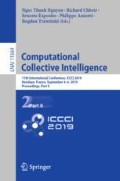Abstract
In tourism information management there are two types of information networking that may assist the personalized self-tour planning: (1) tourist points of interest (regional attractions, activities and events) and (2) tourism services (hotel, gastronomy and transport). Therefore, the most important problem discussed in the paper is the integration of the tourism information networks for individual user optimization and personalization. In order to make this connection, there are overviewed three ontological approaches that lead to the recognition of tourist values. The object-based logic is explained as the first model, then the service-based model follows, with the experience-oriented model being discussed as the last one, thus going from the most passive way of self-tour planning to its most active form (through co-creation of the tourist route). The main focus of the latter approach is on designing two stages of the tourist experience that would manifest itself during the tour. Its operationalization is done by expert knowledge rooted in the tourist application functionality. The practical part of the paper deliberates the unique values that can be used to inform and enhance the smart and the intelligent tourist self-tour planner.
Access this chapter
Tax calculation will be finalised at checkout
Purchases are for personal use only
References
Bahramiana, Z., Abbaspoura Ali, R.: An ontology-based tourism recommender system based on spreading activation model. In: The International Archives of the Photogrammetry, Remote Sensing and Spatial Information Sciences, vol. XL-1/W5 (2015)
Botterill, D., Platenkamp, V.: Key Concepts in Tourism Research. Sage Publishing Ltd., Los Angeles (2012)
Card, S.K., Mackinlay, J.D., Shneiderman, B.: Information visualization. In: Card, S.K., Mackinlay, J.D., Shneiderman, B. (eds.) Readings in Information Visualization: Using Vision to Think, pp. 1–34. Morgan Kaufmann, San Francisco (1999)
Carroll, J.M. (ed.): Making Use: Scenario-Based Design of Human-Computer Interactions. MIT Press, Cambridge (2000)
Chen, L., Nugent, C.: Ontology-based activity recognition in intelligent pervasive environments. Int. J. Web Inf. Syst. 5(4), 410–430 (2009)
Cheverst, K., Davies, N., Mitchell, K., Smith, P.: Providing tailored (context-aware) information to city visitors. In: Brusilovsky, P., Stock, O., Strapparava, C. (eds.) AH 2000. LNCS, vol. 1892, pp. 73–85. Springer, Heidelberg (2000). https://doi.org/10.1007/3-540-44595-1_8
Cho, Y., Kim, J.: Application of web usage mining and product taxonomy to collaborative recommendations in e-commerce. Expert Syst. Appl. 26(2), 233–246 (2004)
Dorrestijn, S., van der Voort, M., Verbeek, P.-P.: Future user-product arrangements: combining product impact and scenarios in design for multi age success. Technol. Forecast. Soc. Chang. 89, 284–292 (2014)
Fink, J., Kobsa, A.: User modeling for personalized city tours. Artif. Intell. Rev. 18, 33 (2002). https://doi.org/10.1023/A:1016383418977
García-Crespo, A., Chamizo, J., Rivera, I., Mencke, M., Colomo-Palacios, R., Gómez-Berbís, J.M.: SPETA: social pervasive e-tourism advisor. Telematics Inform. 26, 306–315 (2009)
Long, S., Kooper, R., Abowd, G.D., Atkeson, C.G.: Rapid prototyping of mobile context-aware applications. the cyberguide case study. In: Proceedings of the 2nd ACM International Conference on Mobile Computing. ACM Press, Rye (1996)
Makedos, K., Tryfona, N.: PLATIS: a personalized location-aware tourist information system. In: Proceedings of the Second ACM SIGSPATIAL International Workshop on Mobile Geographic Information Systems (2013)
Martínez, L., Rodríguez, R.M., Espinilla, M.: REJA: a georeferenced hybrid recommender system for restaurants. In: Proceedings of IEEE/WIC/ACM International Conference on Web Intelligence and Intelligent Agent Technology, pp. 187–190 (2009)
Moura, H., et al.: Developing a ubiquitous tourist guide. In: Proceedings of the 19th Brazilian Symposium on Multimedia and the WebMedia (2013)
Sanders, L., Stappers, P.J.: From designing to co-designing to collective dreaming: three slices in time. Interactions 21(6), 24–33 (2014)
Stojanovic, L., Maedche, A., Motik, B., Stojanovic, N.: User-driven ontology evolution management. In: Gómez-Pérez, A., Benjamins, V.R. (eds.) EKAW 2002. LNCS (LNAI), vol. 2473, pp. 285–300. Springer, Heidelberg (2002). https://doi.org/10.1007/3-540-45810-7_27
Stickdorn, M., Zehrer, A.: Service design in tourism: customer experience driven destination management. In: Clatworthy, S. (ed.) Proceedings of the 1st Nordic Service Design Conference, Oslo, Norway (2009)
Tolk, A., Diallo, S.Y., Turnitsa, C.D.: Ontology driven interoperability – M&S applications, whitepaper in support of the I/ITSEC Tutorial 2548, VMASC report, Old Dominion University, Suffolk, VA (2006)
Tussyadiah, I.P.: Technology and behavioral design in tourism. In: Fesenmaier, D.R., Xiang, Z. (eds.) Design Science in Tourism. TV, pp. 173–191. Springer, Cham (2017). https://doi.org/10.1007/978-3-319-42773-7_12
Zhou, T., Kuscsik, Z., Liu, J., Medo, M., Wakeling, J.R., Zhang, Y.: Solving the apparent diversity-accuracy dilemma of recommender systems. Nat. Acad. Sci. 107(10), 4511–4515 (2010)
https://www.cntraveler.com/stories/2015-02-24/travel-apps-that-can-replace-your-tour-guide
Acknowledgment
“The project is financed by the Ministry of Science and Higher Education in Poland under the programme “Regional Initiative of Excellence” 2019–2022 project number 015/RID/2018/19 total funding amount 10 721 040,00 PLN”.
Author information
Authors and Affiliations
Corresponding authors
Editor information
Editors and Affiliations
Rights and permissions
Copyright information
© 2019 Springer Nature Switzerland AG
About this paper
Cite this paper
Hołodnik, D., Perechuda, K. (2019). Route Ontology in Value Recognition of Self-tour Planning Application. In: Nguyen, N., Chbeir, R., Exposito, E., Aniorté, P., Trawiński, B. (eds) Computational Collective Intelligence. ICCCI 2019. Lecture Notes in Computer Science(), vol 11684. Springer, Cham. https://doi.org/10.1007/978-3-030-28374-2_30
Download citation
DOI: https://doi.org/10.1007/978-3-030-28374-2_30
Published:
Publisher Name: Springer, Cham
Print ISBN: 978-3-030-28373-5
Online ISBN: 978-3-030-28374-2
eBook Packages: Computer ScienceComputer Science (R0)

